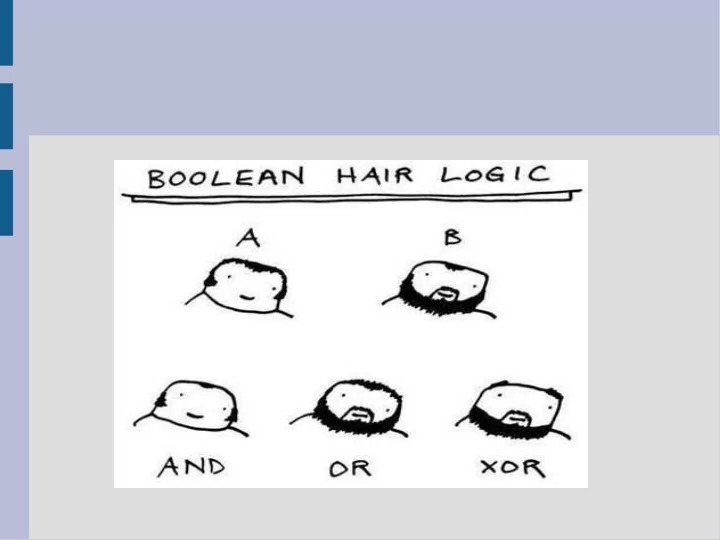

; and if Please always put {} after if-statements The compiler will let you get away with not putting these (this leads to another issue) If you do not put {} immediately after an if, it will only associate the first command after with the if-statement (see: ifAndSemi.cpp)
Logical operators These are all the operators that result in a bool: > (greater than), e.g. 7 > 2.5 is true == (equals), e.g. 5 == 4 is false < (less than), e.g. 1 < 1 is false >= (greater than or equal to), e.g. 1 <= 1 is true != (not equal to), e.g. 8 != 7 is true <= (less than or equal to), e.g. 6 <= 2 is false ! (not, negation), e.g. !true is false
Random numbers To use random numbers, you need to do: 1. Run srand(time(0)) once 2. Use rand() to actually generate a number DO ONLY ONCE AT THE START OF MAIN AND NEVER AGAIN! (See: rng.cpp)
Complex expressions Two boolean operators: && is the AND operations || is the OR operations
Complex expressions AND operation removes Ts from the result The OR operation adds Ts to the result Evaluate (!p OR q) AND (p) p q !p !p OR q (!p OR q) AND (p) T T F T T T F F F F F T T T F F F T T F
Complex expressions Write an if statement for checking if a variable (int) x is a positive odd number. Hint: You may want to use the remainder (also called modulus) operator (the % sign). For example, 5 % 3 = 2
Complex expressions int x = 9, y = 7;
Complex expressions Write boolean expressions for each of the following truth tables: 2. 1. XOR 3. 4.
Complex expressions Humans tend to use the english word OR to describe XOR (exclusive or) “You can get a side order of a salad, fries or a soup.” Did you think the statement above meant you could get all three?
Complex expressions If statements for when x... ... is between 10 and 20 (inclusive) Cannot say: 10 <= x <= 20 (why?) ... is a vowel (x is type char)
Short-circuit evaluation Short-circuit evaluation is when you have a complex bool expression (&& or ||) but you don't need to compute all parts. If this is false, then it will not check next (See: shortCircuit.cpp)
Short-circuit evaluation Simple cases of short-circuit: When you have a bunch of ORs if( expression || exp || exp || exp ) Once it finds any true expression, if statement will be true When you have a bunch of ANDs if( expression && exp && exp && exp ) Once it finds any false expression, if statement will be false
Complex expressions Be careful when negating, that you follow De Morgan's Law: bool a, b; !(a OR b) is equivalent to (!a) AND (!b) !(a AND b) is equivalent to (!a) OR (!b) “Neither rainy or sunny” means “Both not rain and not sunny”
Nested if statements You can have as many if statements inside each other as you want.
Nested if statements From a truth table perspective, nested loops are similar to AND The previous if code is equivalent to: However, sometimes you want to do other code between these evaluations
Nested if statements (See: bridgeOfDeath.cpp)
Scope Where a variable is visible is called its scope Typically variables only live inside the block (denoted with matching { and } ) A variable lives until the block is closed, so inner blocks can see everything from the block it was created inside
Scope (See: scope.cpp)
If... if... else!
If... if... else! When in doubt, use parenthesis and blocks! (Some people like to put the first brace after the if, others on a new line) What happens if you have an if if else? (See: ifIfElse.cpp)
Multiway if/else This is a special format if you put an if statement after an else. This second “if statement” only is tested when the first “if statement” is not true (See: grades.cpp)
Switch A switch statement checks to see if a variable has a specific value. Controlling Variable Case label Break statement
Switch If the value of the controlling variable is found in a case label, all code until a break statement is ran (or the switch ends) Switch statements only test equality with case labels (not greater or less than) (See: switch.cpp)
Switch Switch statements can be written as multiway if/else statements. Could use just “if statements” but “else if” shows only one of these will run (See: switchToIf.cpp)
Conditional operator We will not use in this class, but if you use other people's code you will encounter Shorthand for an if-else statement (boolean) ? [if true] : [if false] Example: max = (x>y) ? x : y; (See: max.cpp)
Recommend
More recommend